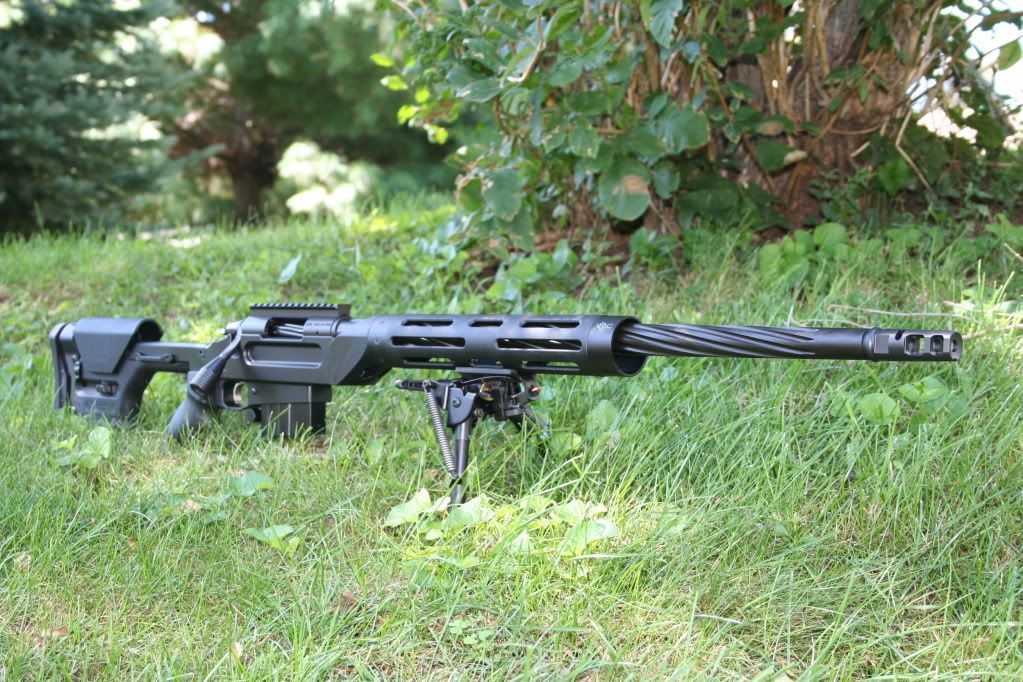I called the Burlington Engineering .
Melonite:
Melonite Processing: Melonite Q
Improved Wear Resistance
Improved Running Properties
Increased Fatigue and Rolling Fatigue Strengths
Heat Resistance
Black Color
Melonite Processing: Melonite QP
lncludes the properties of Melonite Q
Lower coefficient of Friction
Decreased surface roughness
Melonite Processing: Melonite QPQ
lncludes the properties of Melonite Q and QP
Low Light Reflection
Further Decreased Coefficient of Friction
Enhanced Corrosion Resistance (Not suitable for stainless)
QP sounds ideal for the barrel.
When I called Burlington Engineering today: They said that they heat the barrel to 1075 degrees F. They say just so long as your original heat treat temp was atleast 20 degree's higher you will not lose your heat treat.
My next call was to Krieger to ask them about the heat treat on their barrels. He says that the blanks are sent for heat treatment out off premise. He also said that anything over 900 degrees would lose the "temper" I assume he is talking about the heat treat.
As attractive as it sounds I just don't feel like screwing up a perfectly good barrel...
The company said they do guns all the time though... the only catch is they parts must be fully disassembled and exclude springs, everything else can be treated.
I hear that Accuracy International uses this coating on their rifles. Hopefully someone in the know can help me with some of my questions as I also am having a long distance bolt gun built up:
I wonder what the application would be for it?
Could the entire action be treated, including the bolt, firing pin, etc?
Would the lugs be OK if treated?
Does this reduce or compromise the the strength of the action?
Would this have a negative impact on the accuracy of the barrel?
Would the barrel be treated before being chambered or after? I ask because if it reduces friction, the bolt will be taking all the pressure if the case does not grip the sides of the chamber.
Thanks.
- Dave
Melonite:
Melonite Processing: Melonite Q
Improved Wear Resistance
Improved Running Properties
Increased Fatigue and Rolling Fatigue Strengths
Heat Resistance
Black Color
Melonite Processing: Melonite QP
lncludes the properties of Melonite Q
Lower coefficient of Friction
Decreased surface roughness
Melonite Processing: Melonite QPQ
lncludes the properties of Melonite Q and QP
Low Light Reflection
Further Decreased Coefficient of Friction
Enhanced Corrosion Resistance (Not suitable for stainless)
QP sounds ideal for the barrel.
When I called Burlington Engineering today: They said that they heat the barrel to 1075 degrees F. They say just so long as your original heat treat temp was atleast 20 degree's higher you will not lose your heat treat.
My next call was to Krieger to ask them about the heat treat on their barrels. He says that the blanks are sent for heat treatment out off premise. He also said that anything over 900 degrees would lose the "temper" I assume he is talking about the heat treat.
As attractive as it sounds I just don't feel like screwing up a perfectly good barrel...
The company said they do guns all the time though... the only catch is they parts must be fully disassembled and exclude springs, everything else can be treated.
I hear that Accuracy International uses this coating on their rifles. Hopefully someone in the know can help me with some of my questions as I also am having a long distance bolt gun built up:
I wonder what the application would be for it?
Could the entire action be treated, including the bolt, firing pin, etc?
Would the lugs be OK if treated?
Does this reduce or compromise the the strength of the action?
Would this have a negative impact on the accuracy of the barrel?
Would the barrel be treated before being chambered or after? I ask because if it reduces friction, the bolt will be taking all the pressure if the case does not grip the sides of the chamber.
Thanks.
- Dave



